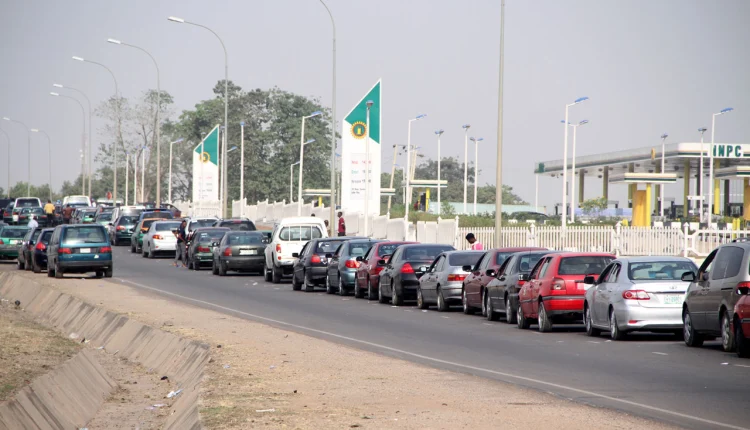The petrol scarcity has intensified in Lagos and the Federal Capital Territory (FCT), with the Nigerian National Petroleum Company Limited (NNPCL) and oil marketers attributing the issue to disruptions in supply at key depots. The situation has led to long fuel queues, causing frustration amongst motorists.
Reports indicate that some oil marketers and transporters in Lagos and the FCT reduced the number of trucks dispatched to load fuel, influenced by concerns over a planned nationwide hunger protest. Petrol dealers instructed some truck drivers to pause operations, particularly those transporting products from southern coastal depots to northern regions. This decision has contributed to the fuel shortages being experienced in Abuja, Nasarawa, Niger, Lagos, Ogun, and other areas.
The NNPCL acknowledged that the fuel queues were due to hitches in the discharge operations of a few vessels. The national oil company assured the public that it worked tirelessly with all stakeholders to resolve the situation and restore normalcy.
Our correspondents observed the emergence of fuel queues at various stations. In Abuja, long lines formed at the Nipco Filling Station on the Zuba-Kubwa Expressway, while the Conoil Filling Station opposite NNPC headquarters saw an influx of motorists. Several other stations along the busy Kubwa-Zuba Expressway, including Shafa, Salbas, and Gegu Oil, were closed due to a lack of fuel.
In Lagos, fuel queues were reported at major stations along the Lagos/Abeokuta Expressway, particularly in Abule-Egba, Agege, LASU/Igando, Egbeda, and Iyana-Ipaja. The scarcity led to petrol being sold for between N650 and N850 per liter in some parts of Lagos on Saturday. In Ogun State, stations in the Ibafo and Magboro areas along the Lagos-Ibadan Express Road either shut down or were overwhelmed with long lines of vehicles and motorcycles.
Despite being open, several stations, including Enyo, Heyden, Haoti, and Osadol in Ibafo, and Quest in Magboro, were not dispensing petrol.
Commenting on the issue, Zarma Mustapha, Deputy National President of the Independent Petroleum Marketers Association of Nigeria (IPMAN), linked the queues to the planned protest. He noted that many transporters and marketers were hesitant to dispatch trucks for loading due to uncertainties surrounding the protest.
“The planned protest is one of the reasons for the queues we are seeing now. Most transporters and marketers are skeptical about dispatching their trucks for loading at the coastal depots for delivery to the hinterlands. Everyone is watching to see how the protest unfolds,” Mustapha stated.
Mustapha urged protest organizers to act responsibly to avoid losses to private businesses, the government, and individuals. “While it is legitimate to protest, it should be done responsibly to prevent hoodlums from hijacking the demonstration and causing chaos. There must be peace during protests to avoid dire consequences for everyone,” he added.
Olufemi Soneye, Chief Corporate Communications Officer of NNPC, echoed similar sentiments in a statement, attributing the supply tightness in Lagos and the FCT to discharge hitches at some fuel vessels. He emphasized that NNPCL and stakeholders were addressing the issue to restore normal operations.
IPMAN National Vice President, Hammed Fashola, explained that some association members could not purchase fuel at private depots on Friday due to high prices. He noted that the disruption in supply had driven up demand and prices. “The law of demand and supply has come into play. When demand exceeds supply, prices rise. Many marketers didn’t buy the product because they can’t sell it at high prices at their stations,” Fashola explained.

